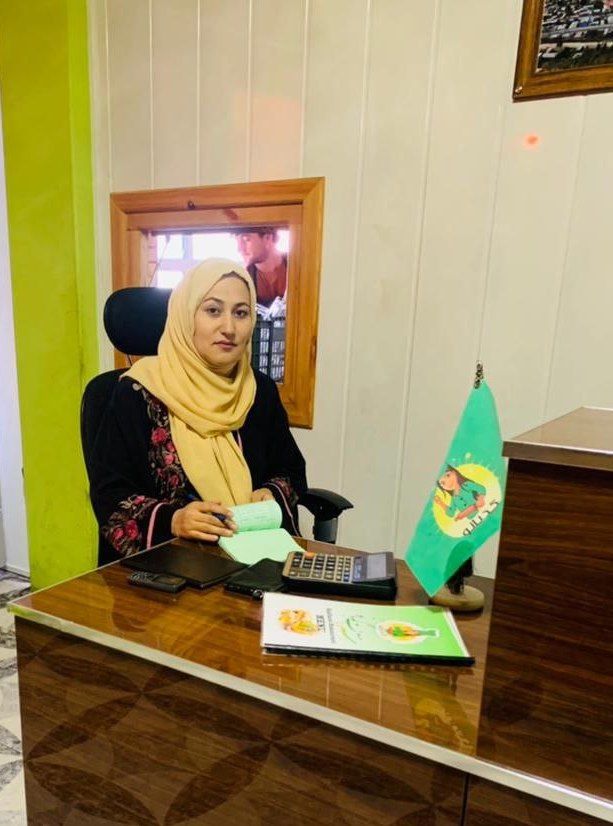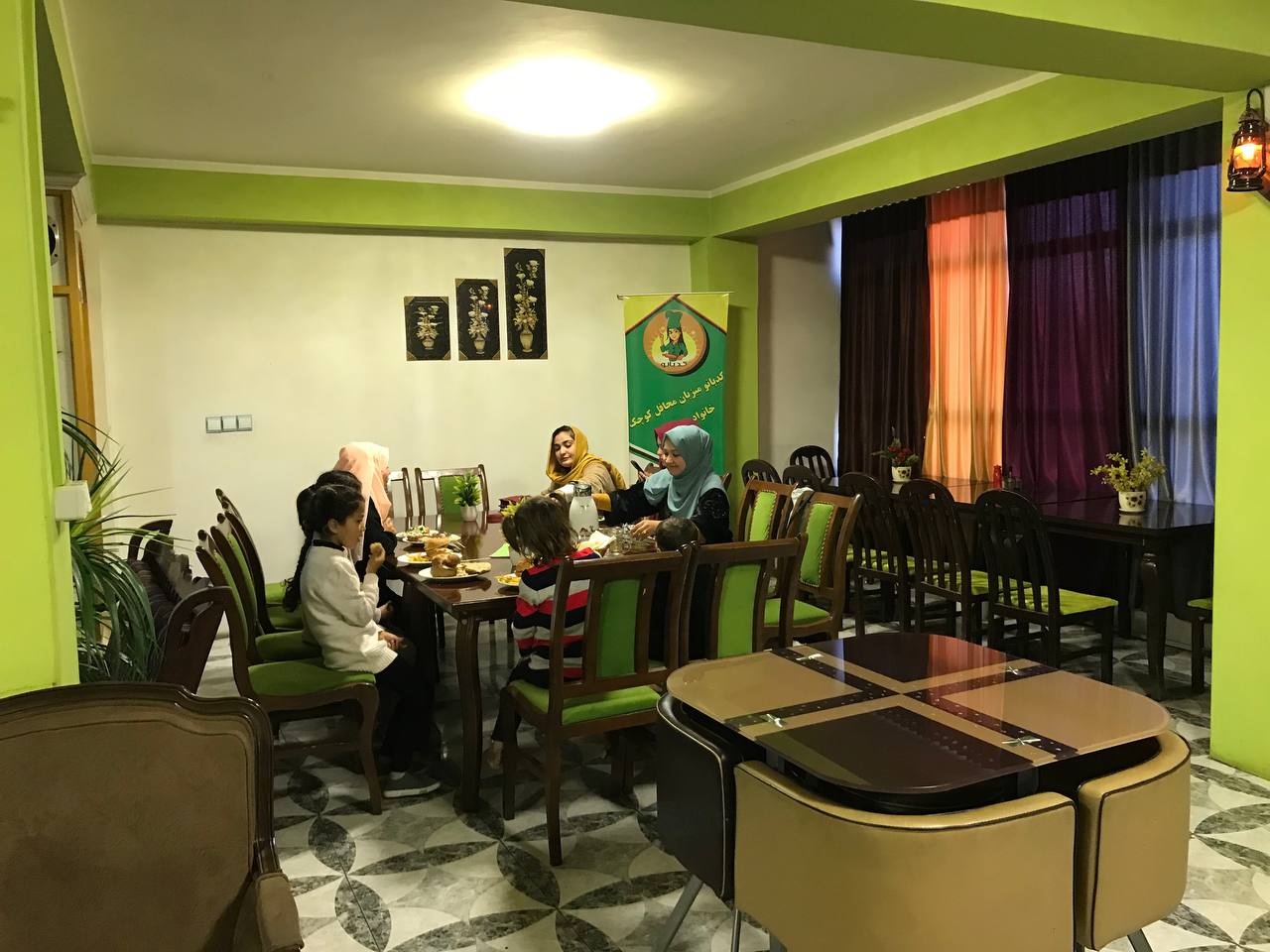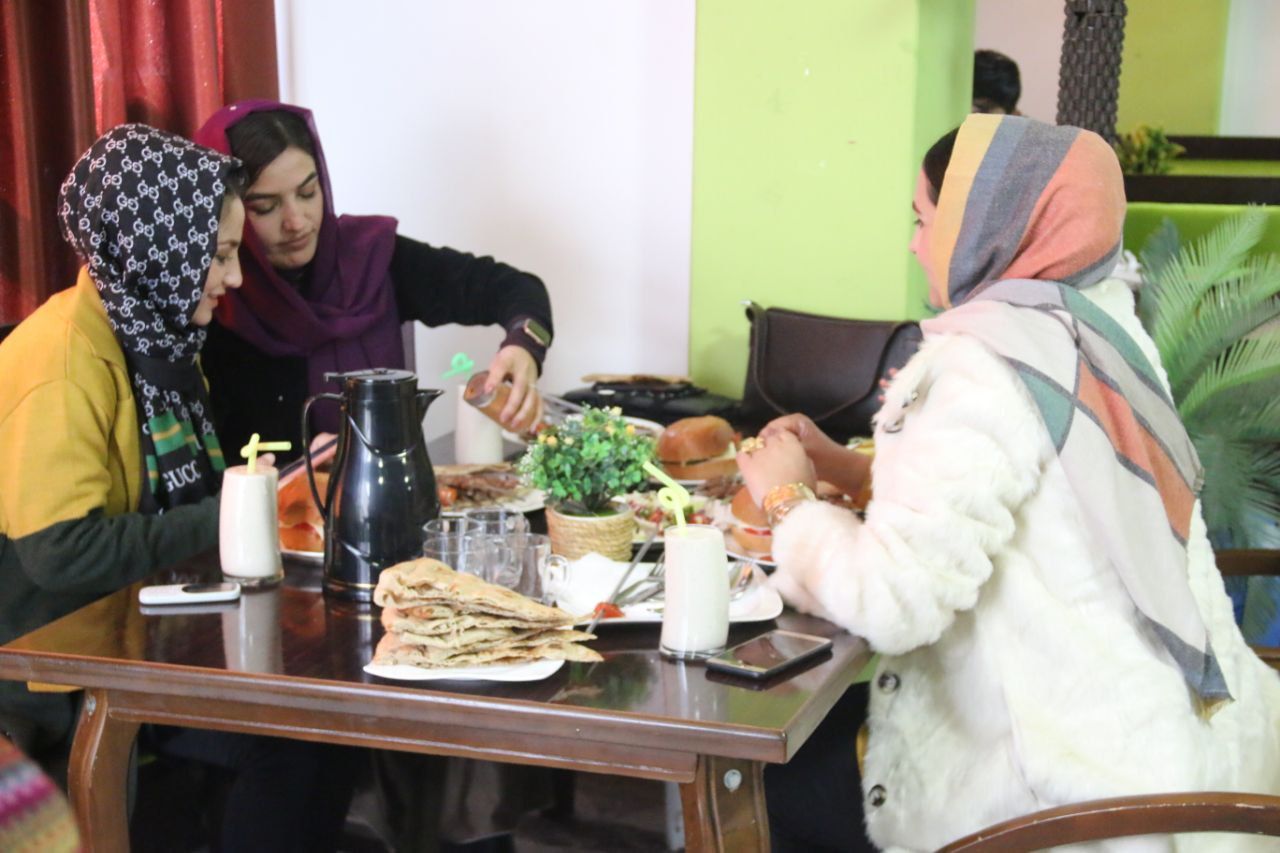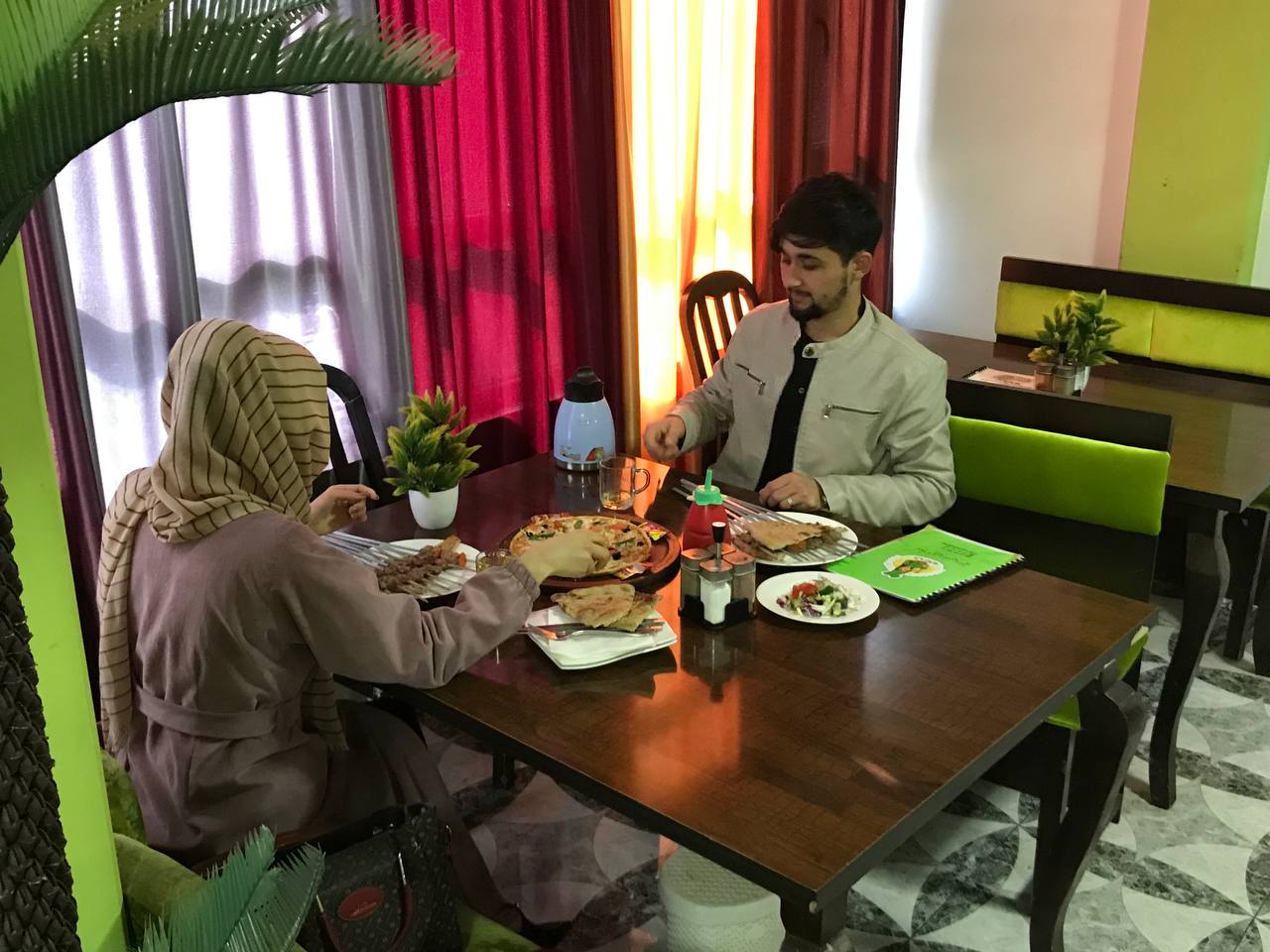Badakhshan’s First Restaurant for Women Struggles to Keep Doors Open
Opened as the first restaurant explicitly for women, Kad Banoo has been forced to allow more male patrons in order to encourage families, without whom the restaurant could not afford to stay open.

Opened as the first restaurant explicitly for women, Kad Banoo has been forced to allow more male patrons in order to encourage families, without whom the restaurant could not afford to stay open. Although the Taliban have discouraged public gatherings of men and women, Ms. Karimi continues to admit parties of both men and women in their family section.
— One Day in Afghanistan —
Reporting by Najia Sorosh, and Ahmad Sayiq Danishjo, written by Abdul Ahad Poya, edited by Mohammad J. Alizada and Brian J. Conley
BADAKHSHAN, 01/24//2022 - Following our weekly One Day in Afghanistan coverage, this time, AiA portrays the story of a woman who has tackled numerous challenges to open a safe and comfortable space for her peers in Afghanistan’s northeastern Badakhshan province.
Simin Karimi is 32 years-old and opened Kad Banoo, a restaurant for women, some five years ago in Faizabad, Badakhshan’s capital. Faizabad is just over 500 km north of Kabul.
It's 8 in the morning and I am walking in Faizabad city, heading towards Ms. Karimi’s restaurant, which is located in a corner of the city. Upon entering, the pleasant aroma of Afghan food being cooked hits my nostrils.

Ms. Karimi greets me as I walk into her restaurant. The ground floor of the restaurant is furnished with tables and chairs on one side, while the other side is designed in a more traditional Afghan fashion with a raised seating area adorned with carpets and comfortable pillows for those that want to experience a more homey atmosphere. The upper floor includes a space for families that want to bring in male members.
For more information about the struggle of women in Afghanistan following the Taliban takeover, check out these previous articles by Alive in Afghanistan, (Woman Owned Businesses at Risk in Afghanistan), (Women No Longer Able to Feed Their Families), (The Struggle for Recognition Continues), (Baking Bread to Feed Her Children), (Hard Work, Lost Hope of an Afghan Embroiderer), (Only the Dark Stops Her), (Women Resist a Return to Repression), and (Nowhere is Like Your Own Country).
Simin married her husband Zaman 14 years ago and the couple has six kids, four boys and two girls.
“My husband is not only a good man, but an excellent advisor and supporter as well,” Ms. Karimi says.
Their children, 13 year-old Mustafa Zawash is in 8th grade, 12 year-old Maryam is in 7th grade, 11 year-old Zaynab is in 6th grade, 8 year-old Saiqal is in 3rd grade and 6 year-old Azarash will start school in the spring.
Their last child, Hoshang, is 5 months old, and his mama’s favorite.
Around 8:35 22 year-old waitress Zuhra Zarion, who has been working at Kad Banoo for 3 years, enters from the kitchen with a platter containing glasses and a pot of Shor Chai.
Shor Chai, a tradition in northeastern Afghanistan, is a variation of milk tea. However, instead of using sugar to sweeten the tea like in India, Pakistan, and other parts of Afghanistan, people here add salt and crushed walnuts to it. The first and second sip may be a little hard to take but by the third sip, one can get used to the taste and it is quite delicious.
Ms. Zarion is paid a salary of 7,000 Afghanis per month. She uses this money for her family's daily expenditures.
The sweet Badakhshi dialect can pique the interest of any listener. It keeps me enthralled by Ms. Karimi’s conversation. The conversation eventually comes to the inspiration and motive behind opening Kad Banoo.
“Because of our traditional values, it’s a new thing for women to invest in the restaurant sector,” Ms. Karimi says. But she decided to open the restaurant and go into business despite her fear and with full support of her life partner.
Simin adds, “The families in Badakhshan do not allow their women and girls to eat out at a restaurant that has male personnel and serves male patrons. This reason alone was the motivation to open a restaurant for women.”
“Sometimes restaurants were not a safe space for us when we went out to eat, this compelled me to talk to my friends and family and decide to open our own restaurant so we can have a safe space for women to go out to eat, to laugh, have fun and feel comfortable,”
Badakhshi is a term used for people, dialect(s) and items originating from Badakhshan.
Afghanistan is a male-dominated and traditionally conservative society where even going out to eat can cause trouble for women. The harassment from male wait staff, and other patrons means women may not feel safe in most restaurants.

“I was afraid the Taliban would cause problems for me, so I closed the restaurant for 5 months following their takeover of Badakhshan in August of last year. With the support and intervention of our friends we got permission from the Taliban and opened the restaurant again. ” Ms. Karimi says.
Making an environment such as this one for women while creating jobs for others has been a childhood dream of Ms. Karimi’s. The kitchen and the entrance can be seen from where we are sitting. There are three women and six men busy making different kinds of meals.
Ms. Karimi’s business was improving daily before the collapse of the previous Afghan government, the number of customers was increasing daily and profits from the restaurant, rounded up, amounted to around 3,000 Afghanis per day while the restaurant employed 9 men and women staff, but the situation has changed now.
According to Ms. Karimi, one of the tragic and absurd opinions in Badakhshan is that any female-only space managed by women is viewed as a place for the entertainment of men and known as a “brothel.”
Ms. Karimi believes this issue is because of the existing misogyny in Afghanistan. Most of the people raising these issues are those that are in close competition with women and are fearful that their businesses will be harmed and slowed down if places like Kad Banoo are created by women themselves. Men who are busy in the same line of work use “bad mouthing and accusations” against women as a weapon to get rid of their competitors.
It's now 12 pm and we are in the kitchen to see how the staff prepares the food. According to Ms. Simin, in addition to serving delicious food to their patrons, they also hold events like birthdays, wedding anniversaries, and other special events at guests' request.
I can see one woman cooking Mantoo but she doesn’t want to talk, the waitress Zuhra is busy washing dishes.
24 year-old Faisal Badakhsh is in charge of making Ashak. Mr. Badaksh also studies Dari Literature at a public university in Badakhshan in addition to working at Kad Banoo.
“Most universities have been closed since the Coronavirus pandemic began, as well as when the Taliban took over, so I help my dad, who is a farmer, by working at this restaurant while I am not studying,” Mr. Badakhsh tells Alive in Afghanistan. Faisal earns 7,000 Afghanis per month, which he spends on his daily needs, as well as helping his family of 9.
It’s lunchtime and Ms. Simin and I are both looking toward the entrance hoping for customers to walk in. Although it’s nearly 1 pm, no customers have been to the restaurant yet.
“The number of customers have decreased dramatically since the Taliban takeover, most days our meals are wasted because no one comes to the restaurant,” Ms. Simin says.
Most Afghan signature dishes take a while to cook and cannot be prepared only when customers order, so the kitchen has to make them in advance, in the hopes of having enough customers to finish what they have prepared.
Another half an hour passes without any customers arriving. The atmosphere is somber. According to Ms. Karimi, before the Taliban conquered Badakhshan, they had customers from all different walks of life, including foreigners, students, families, and the staff of different offices would all eat at the restaurant.
Now the Taliban do not allow men and women to eat together, even if they are husband and wife or are engaged. Before the Taliban took over, the upstairs section was designated for families and an area where women could bring in male company.
Simin, the cooks, waiters and I all keep looking toward the entrance in the hopes that even one customer will walk in, but it’s now 1:30 in the afternoon. Everyone is silent and no customer has walked in.
The sadness is evident in Simin’s face. She is so sad that I no longer have the courage to continue interviewing her. I fear that she might decide to dump her anger on me.
“Can’t you see, you didn’t clean that large stain,” Simin yells at Zuhra, but the stain is not what is bothering her, the lack of customers is the real issue. This happens twice, she points out a table with a messy place setting or that a platter was not cleaned properly.

I dare to ask about her future plans so I can at least try to change the mood.
“I used to have big dreams about expanding Kad Banoo. I wanted to open up branches in different districts of Badakhshan and other provinces, I wanted to make a system for people to order online, and do home deliveries, which all seem like a far fetched dream now,” Ms. Simin cites somberly.
She adds, “I don’t have any hope or plans for the future, I have lost hope and only want to take care of my children.”
Tears form in her eyes as she talks about the future. She goes silent for a moment, then sighs deeply and says, “I not only have not made any profits lately but I owe rent for the restaurant and haven’t been able to pay staff members.”
Since Afghanistan's economic collapse due to the freezing of international aid and government assets, Afghan families are increasingly strapped for cash. People are struggling, which means they can’t afford many of the necessities in life, let alone the luxury of eating out. A lack of customers means businesses are struggling even further and can’t afford to pay workers, which in turn exacerbates the issue.
“My husband used to work as a contractor with the previous government. He invested money in several sectors that didn’t make a good return, so we had to sell our home to pay his debts and now we live in a rental home,” Simin says.
Ms. Karimi, feeling concerned about losing her restaurant tells me, “I feel like the Taliban are going to knock at any moment and say, this is your last day, wrap it up.”
Simin is now more keen to leave the country than she is about keeping the restaurant afloat. She doesn’t want to stay as conditions worsen.
At 1:45 we hear the sounds of boots coming in. Ms. Karima Farhat and her friend Zaynab, regular restaurant customers, enter Kad Banoo. I take the opportunity to sit next to them.
“We come here often with our families and friends, I feel very comfortable here because it’s a restaurant for women,” Ms. Farhat tells me.
Ms. Farhat always hoped there would be a place like this in her home province, the opening of Kad Banoo turned that dream into reality and now she comes here with her friends and university classmates as often as possible.
She enjoys the ambient music in addition to the delicious food.
“If this restaurant didn’t exist, we wouldn’t have permission to eat out,” Zaynab says.
Ms. Farhat adds that Kad Banoo used to play romantic and loud, entertaining music, which the customers liked very much, but now they can only play very slow music at a low volume.
Music was banned during Taliban’s last rule of Afghanistan in the second half of 90’s and early 2000s. This time around, the Taliban have not been able to implement the same drastic measures.

I have not even finished speaking with the two ladies when a bunch of other girls, eight in all, enter the restaurant. They have come after their classes at a private university.
“Opening a restaurant for women is a great initiative by Ms. Karimi, we thank her for making such a safe and calm environment for women while at the same time serving delicious food to us,” one of the girls, Tamana Zaryab, tells Alive in Afghanistan.
But the girls are not as comfortable as they were before the Taliban takeover, the laughter is not as boisterous and loud as it used to be because they don’t want to create problems for the restaurant owner.
Their host, who wishes to remain anonymous, orders appetizers for the girls. According to Ms. Farhat, “Kad Banoo’s seasonal menu has us really interested and we come here at least once a week. Kad Banoo is the only place for mass gatherings and the exchange of our thoughts.”
Another one of the girls who requested to remain anonymous said, “I wanted to open up a restaurant as well but I am happy I didn’t, because my money would have gone to waste. I am now engaged and have made a really good decision to leave the country and make a restaurant wherever I end up. I am really happy I didn’t open a restaurant.”
Her comments deeply affect Ms. Karimi who says, “All my efforts, studies, melting my brain, counted for nothing.”
Simin now even doubts being a human because she does not see the positive results for any of her efforts.
But the other women working in Simin’s restaurant are glad they have jobs, they are also hopeful that they will be able to do better, and pave the way for the growth and development of other women.
The table Ms. Farhat and her other friends are using is becoming filled with the different types of food they have ordered while the girls get busy eating their lunch.
Although my one day of profiling Ms. Karimi has ended with the restaurant only having a total of 10 customers, Simin is going to come back the next day with her staff and herself hoping for customers that are becoming scarcer by the day.
